J’utilise Trisquel depuis quelques années et au fil de mes lectures sur les forums et grâce aux interventions fréquentes et verbeuses de Christopher Waid (« Chris » sur les forums) j’ai découvert ThinkPenguin.
Le choix du matériel qui puisse utiliser des pilotes logiciels et microcode (« firmware ») 100% libres est tout aussi important que le choix du système d’exploitation comme tel, mais ce n’est pas facile de trouver du matériel garantit pour sa compatibilité avec une des distributions GNU/Linux recommandées par la FSF. ThinkPenguin facilite grandement la tâche.
 C’est là que j’ai pu acheter une clé USB wifi N SMC Networks (réf. SMCWUSB-N2), et plus tard une clé USB wifi N TPE-N150USB. La première n’y est plus en vente, la deuxième est un modèle plus évolué et surtout, minuscule et certifiée « Respects your Freedom » par la FSF.
C’est là que j’ai pu acheter une clé USB wifi N SMC Networks (réf. SMCWUSB-N2), et plus tard une clé USB wifi N TPE-N150USB. La première n’y est plus en vente, la deuxième est un modèle plus évolué et surtout, minuscule et certifiée « Respects your Freedom » par la FSF.
J’utilise aussi Debian sur mon ordinateur portable principal, un ThinkPad X230 de Lenovo. Ça m’aide à en savoir un peu plus sur cette distribution qui compte des centaines de dérivées pour éventuellement y contribuer, ce qui finirait par bénéficier Trisquel de toute manière.
Malheureusement Lenovo a choisi de bloquer le démarrage de cet ordinateur en incluant dans son BIOS une liste de composantes (dont le wi-fi) servant à valider ce qui est présent. La carte wifi incluse est une variante des cartes Intel utilisant du microcode (ou « micro-logiciel ») non-libre, et si on la remplace par l’équivalent Atheros, le système ne démarre plus!
Le système idéal n’a pas un BIOS non libre (et propose donc CoreBoot), j’aurais souhaité avoir un autre choix au moment de l’achat mais c’est ce que j’ai fini par accepter comme compromis pour mon utilisation personnelle, pour l’instant.
Pour moi il était important de disposer d’une solution qui fonctionne sans microcode non-libre, et Atheros a la réputation de produire du matériel qui remplit cette condition. J’ai donc décidé de ne pas installer le microcode non-libre d’Intel et de toujours utiliser une clés USB externe.
Le micro-code requis pour faire fonctionner ces clés USB n’a pas encore fait son chemin dans Debian, je partage donc ici la méthode pour l’obtenir et ainsi pouvoir activer ces clés.
Atheros AR9170 [0cf3:1002]
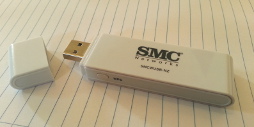
Pour activer cette clé USB sous Debian, il suffit d’installer le paquet firmware-linux-free:
sudo -s
apt-get install firmware-linux-free
Malgré que cette clé soit la plus grosse des deux, je l’aime bien car elle fonctionne directement sans ajout de paquet sur Trisquel 6.
Atheros AR9271 [0cf3:9271]
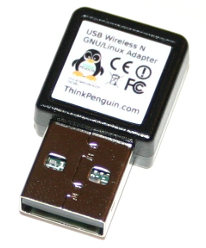
Pour activer cette clé USB sous Debian, il faut compiler le code et installer manuellement le microcode, ou copier manuellement le microcode déjà compilé à partir de sources. Je propose ici la copie manuelle à partir de fichiers dont je connais l’auteur (« jxself », ou Jason Self, employé de la FSF depuis 2010 et mainteneur des paquets linux-libre, le noyau libre Linux).
Voici donc les étapes requises:
sudo -s [entrez votre mot de passe si requis]
cd /lib/firmware
wget https://www.thinkpenguin.com/files/ath9k_firmware_free-version/htc_9271.fw
wget https://www.thinkpenguin.com/files/ath9k_firmware_free-version/htc_7010.fw
Ensuite, redémarrez le système.
Ce microcode est aussi disponible à partir de paquets non-libres, car au départ il avait été copié dans Debian sans les compiler à partir de la source (!). Pour plus de détails, voyez Debian Bug #711470 – ath9k_htc updated firmware for firmware-linux-free.
Je préfère utiliser cette clé car elle est minuscule, mais aussi parce qu’elle a obtenu la certification « Respects your Freedom » récemment annoncée par la Free Software Foundation.
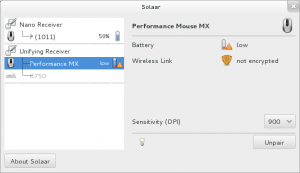
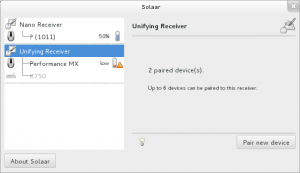
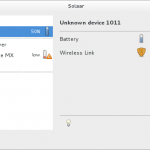
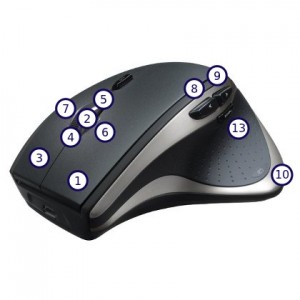
 C’est là que j’ai pu acheter une clé USB wifi N SMC Networks (réf. SMCWUSB-N2), et plus tard
C’est là que j’ai pu acheter une clé USB wifi N SMC Networks (réf. SMCWUSB-N2), et plus tard 
